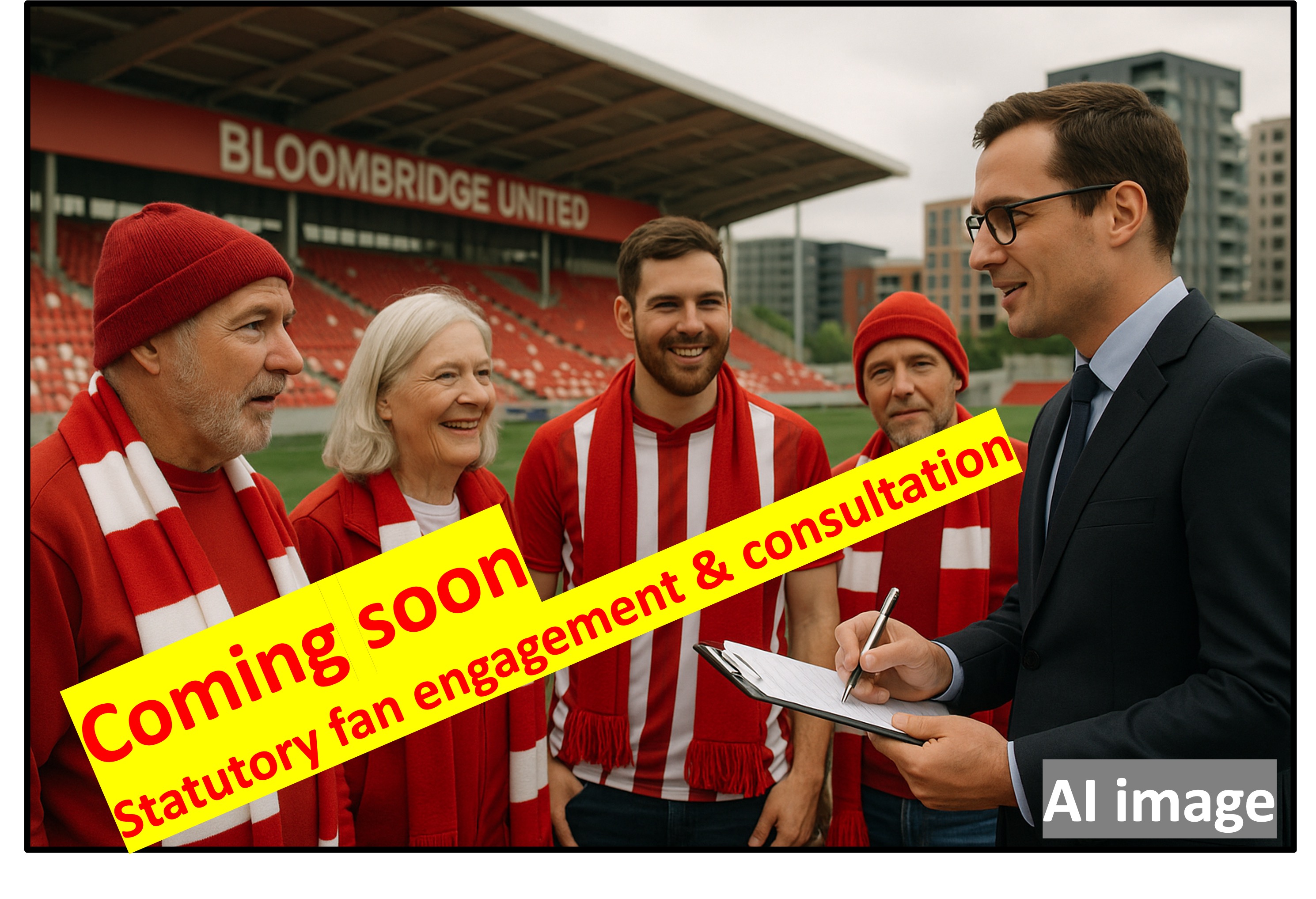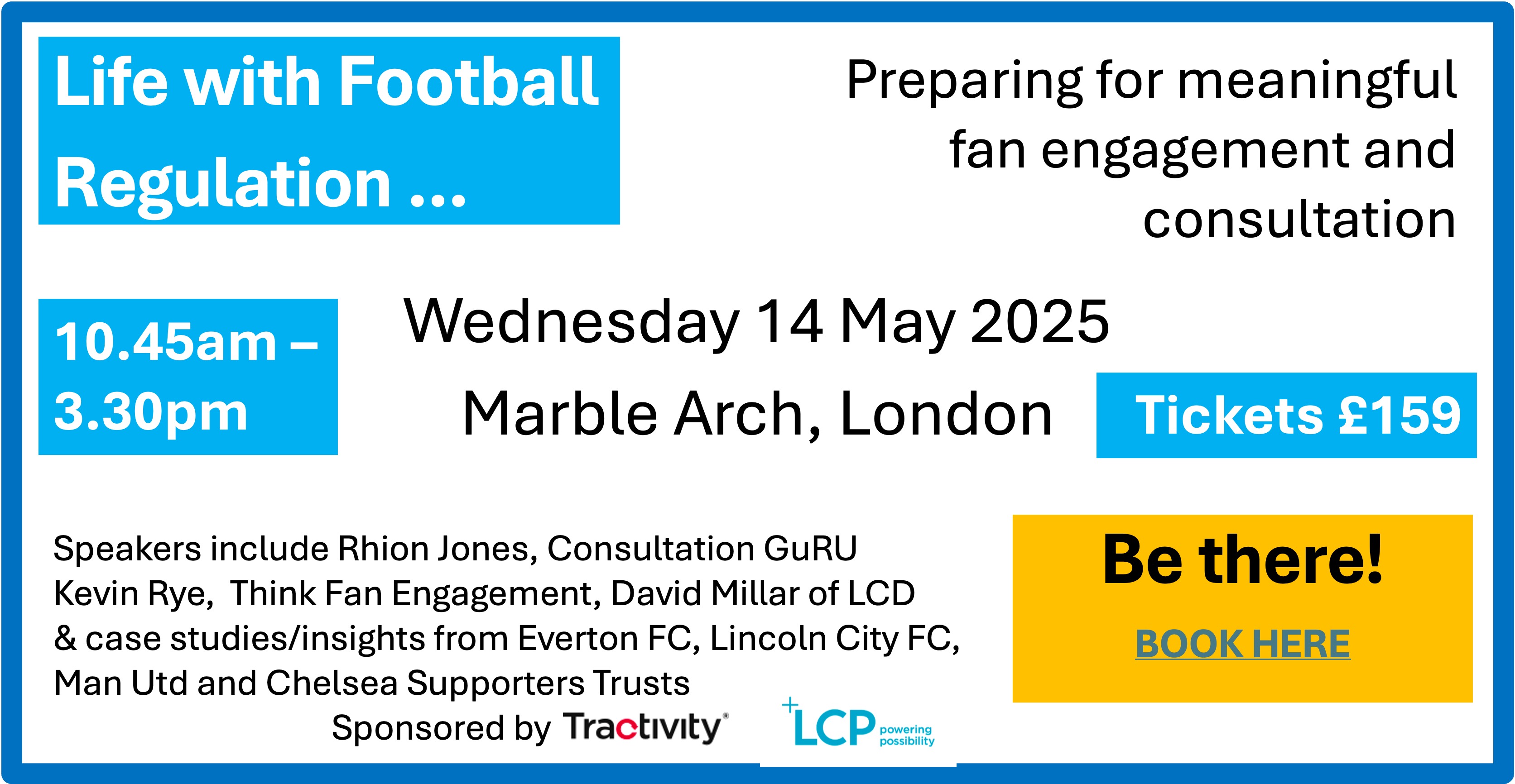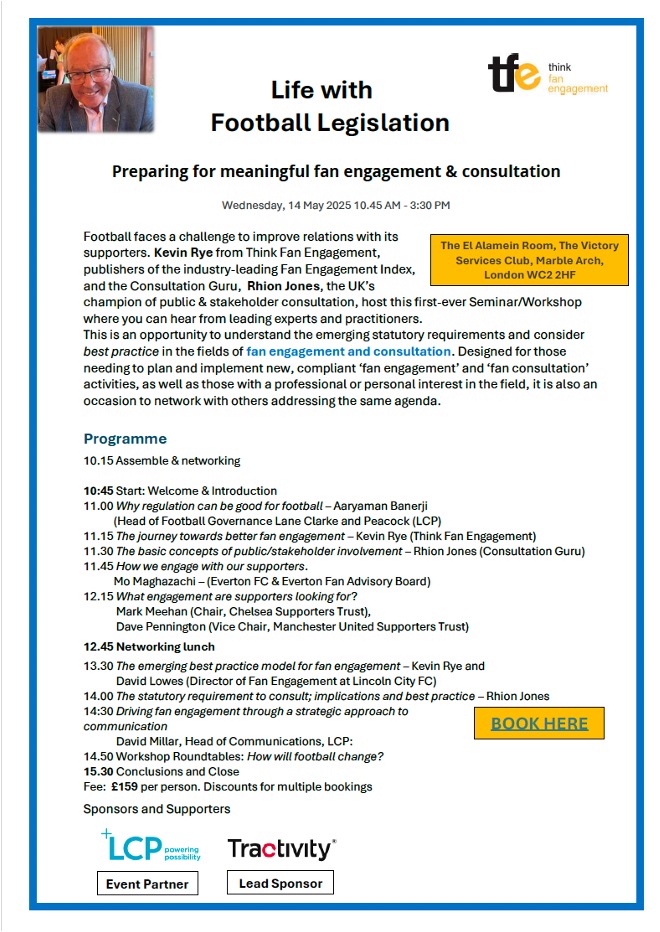This is Blog 98
[Adapted from a longer article I have published on the Tractivity website and called Community Stakeholder dynamics – as illustrated in the world of football ]
The Football Governance Bill – now dribbling its way through Parliament has much wider significance than people realise. For one thing, it is the first time for years that the State intervenes in a brand new area to impose a requirement to consult … by law.

Consultation is undoubtedly a wise and mature process to undertake for many reasons and in lots of situations. But, generally, only in health, local government, planning and allied functions of public administration (eg Regulators) do we find significant statutory duties to consult. Indeed, there has always been an argument that consultation works best when Managers WANT to hear stakeholder views before taking a decision – rather than because they are OBLIGED to do so by law!

So, it will indeed be fascinating to see how this works out – and it is one of the reasons why I am looking forward to our 14th May Seminar in London to explore various aspects and the best ways clubs and fan representatives can handle the new requirements.
But there is a wider – even more fascinating dimension, namely the likely impact upon local communities. For our professional football clubs are now a key driver of social capital and play a massive role in the ‘glue’ that holds society together.
Social capital has been described as the value derived from social networks, trust, and cooperation among people and groups – a kind of wealth, but not of the financial kind. That fund of capital influences how communities respond to what happens around them, be it good or bad. How they live with prosperity and, especially, how they cope with adversity …
Traditionally, the social dynamics of many of our larger towns and cities relied upon Faith groups, Charities, Trade unions or even major employers. They built strong municipal institutions such as magnificent Town Halls, Libraries or Railway stations. The whole fabric of civic and civil society clung like branches from the mighty oak of local pride, self-confidence and a strong sense of identity.
But times have changed … as they did in the United States. The ties that once bound society loosened and in 2000, one author caught the mood perfectly. He was Robert Puttnam – who wrote the best seller, Bowling Alone. He took the title by observing that the bowling leagues that were ubiquitous in mid-century America had all but disappeared, and with them some of the ‘glue’ that bonded people – and even bridged other community divisions. Instead, if you wanted to go bowling, you went on your own – bowling alone!
Instead, new allegiances are visible. Some days ago, I switched on my television and saw a hundred thousand and more citizens of Tyneside on the streets of Newcastle watching their heroes returning in triumph from victory at Wembley, admittedly in the relatively less prestigious ‘Carabao Cup’. Here was a celebration of ‘place’; a compelling mark of loyalty and commitment. For areas seeking to rebuild confidence, to revitalise ‘left behind’ communities and bring together multi-ethnic and multi-cultural nodes, football can be a tremendous unifying force. Progressive Councils already work closely with clubs, especially when they seem able and willing to reach young people and deliver services that the established bureaucracies struggle to meet.
There are excellent examples of football clubs, both large and small, making a great contribution to local communities. There are dozens of examples of valuable outreach work, many involving players as role-models encouraging young people and spreading positive messages on education, health and employment. The range of activities is immense:-
- How Liverpool FC and Everton FC worked together on a venture to support Food Banks
- Brighton & Hove Albion’s special programme for opportunities for disabled people to experience playing football
- How Brentford FC fosters grassroots development of girls’ football
- Arsenal FC’s programme to offer employability education and training opportunities for those struggling to access the labour market.
Although there are marvellous exemplars, the Clubs don’t do it just for altruistic reasons. They have discovered that it’s good for business. It fosters interest in what happens on and off the field. And the better known their ‘brand’, the greater is their worldwide following and ‘fans’ can be counted in their millions.
Giving those fans (… and the proposed legislation does not define them!) a right to be heard raises fascinating questions, for they can be an opinionated bunch, and not necessarily expressing a single opinion. These ‘stakeholders’ will need to be managed with care and sensitivity. They will rejoice in success but be among the first to notice things going wrong. Smart Clubs will study how other industries cope with those who see themselves as ‘critical friends’. They will learn what information to share. When? and How? They will distinguish those occasions when the fans speak for those who attend a match every week, and those where they speak for the wider community and maybe seek to influence the priceless outreach programmes discussed above.
Ultimately, regulating football clubs in England and Wales is likely to have much wider societal implications. Scottish fans will expect nothing less. And maybe supporters of rugby, cricket and other team sports may demand similar rights. For, like it or not, sport is now among the most identity-defining forces around, and those who run and administer it will embark upon an important journey to be a force for all that’s best, and not worst in modern life.
In that endeavour, they will surely make common cause with local government, and that is why I hope that the debate about fan consultation will not be restricted to the football clubs and their supporters but rather embrace Council elected members and officials in whose hands our communities’ future often lies.
Rhion H Jones LL.B
23 April 2025
For More like this - free of charge: now click here
For Full Seminar Programme - Click here

Leave a Comment
I hope you enjoyed this post. If you would like to, please leave a comment below.